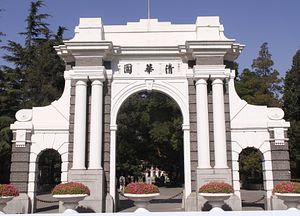Since Xi Jinping took power in November 2012, a new Tsinghua Clique has risen in Chinese politics. In contrast to members of the old Tsinghua Clique, who just happened to be graduates of the same university (such as Hu Jintao, Wu Bangguo, Huang Ju, and Wu Guanzheng), members of the new Tsinghua Clique have strong personal ties with one another.
A key member of the new Tsinghua Clique is Chen Xi, executive deputy director of the Central Organization Department. A native of Fujian, Chen went to Tsinghua University along with Xi Jinping in September 1975 as a Worker-Peasant-Soldier student (gongnongbing xueyuan). Chen and Xi were enrolled in the same department — the Department of Chemical Engineering — with different majors. Chen majored in materialization, and Xi in basic organic synthesis. The two reportedly were roommates for three and a half years, and Xi recruited Chen as a CCP member in November 1978.
After Xi became a member of the Politburo Standing Committee in charge of personnel affairs in October 2007, Chen was quickly promoted from Tsinghua University to the Ministry of Education as a vice minister and deputy party group secretary. Chen was transferred to Liaoning as deputy party secretary in less than two years and was promoted again in seven months to the rank of full minister as the party group secretary of the China Association for Science and Technology, replacing Deng Nan (daughter of Deng Xiaoping).
After Xi became president of the PRC, Chen was appointed as the executive deputy director of the Central Organization Department in April 2013, where he controls the Party’s personnel affairs on behalf of Xi.
Two other members of the new Tsinghua Clique are protégés of Chen Xi at Tsinghua University. Both Hu Heping and Chen Jining have had long association with Tsinghua University. Both went to that university as undergraduates in the early 1980s and then obtained their master’s degrees there. Then the two went abroad for doctoral degrees. Chen went to the United Kingdom for a Ph.D. in civil and environmental engineering, and Hu studied in Japan for a doctoral degree in river basin environments. Hu returned to Tsinghua as an associate professor in the Department of Water Resources and Hydropower Engineering (Hu Jintao’s old department) in December 1996. Chen returned to Tsinghua as an associate professor in the Department of Environmental Science and Engineering in March 1998.
Apparently, Hu Heping was closer to Chen Xi. While Chen was party secretary of Tsinghua University, from February 2002 to November 2008, Hu served under Chen in several different posts. Hu was appointed director of the Organization Department of the Tsinghua University Party Committee in November 2002 and was made dean of the Office of Academic Affairs in September 2003.
In February 2006, both Hu Heping and Chen Jining were appointed vice presidents of Tsinghua University. Hu later succeeded Chen Xi as party secretary of Tsinghua in December 2008, and Chen was promoted to president of Tsinghua in February 2012. Five months after Chen Xi’s appointment as the executive deputy director of the Central Organization Department, Hu was transferred to Zhejiang as a standing member and director of the Organization Department of the Zhejiang Provincial Party Committee. Chen Jining was also promoted to the Ministry of Environmental Protection as the party group secretary in January 2015. Chen Jining was appointed minister of Environmental Protection one month later, and Hu was promoted to deputy secretary of Shaanxi in April 2015.
The three men now have been placed in strategic positions for further promotions. Chen Xi is a good candidate for the position of Central Organization Department director in two years. If he can secure this position, he would be guaranteed a seat on the Politburo and the Secretariat. Chen Jining is a good candidate for a senior position in the State Council and also a good candidate for a membership on the Politburo. Hu Heping also has a good chance to be promoted as party secretary of one of the four centrally administered municipalities (Beijing, Tianjin, Shanghai, and Chongqing) and could enter the Politburo in that capacity.

































